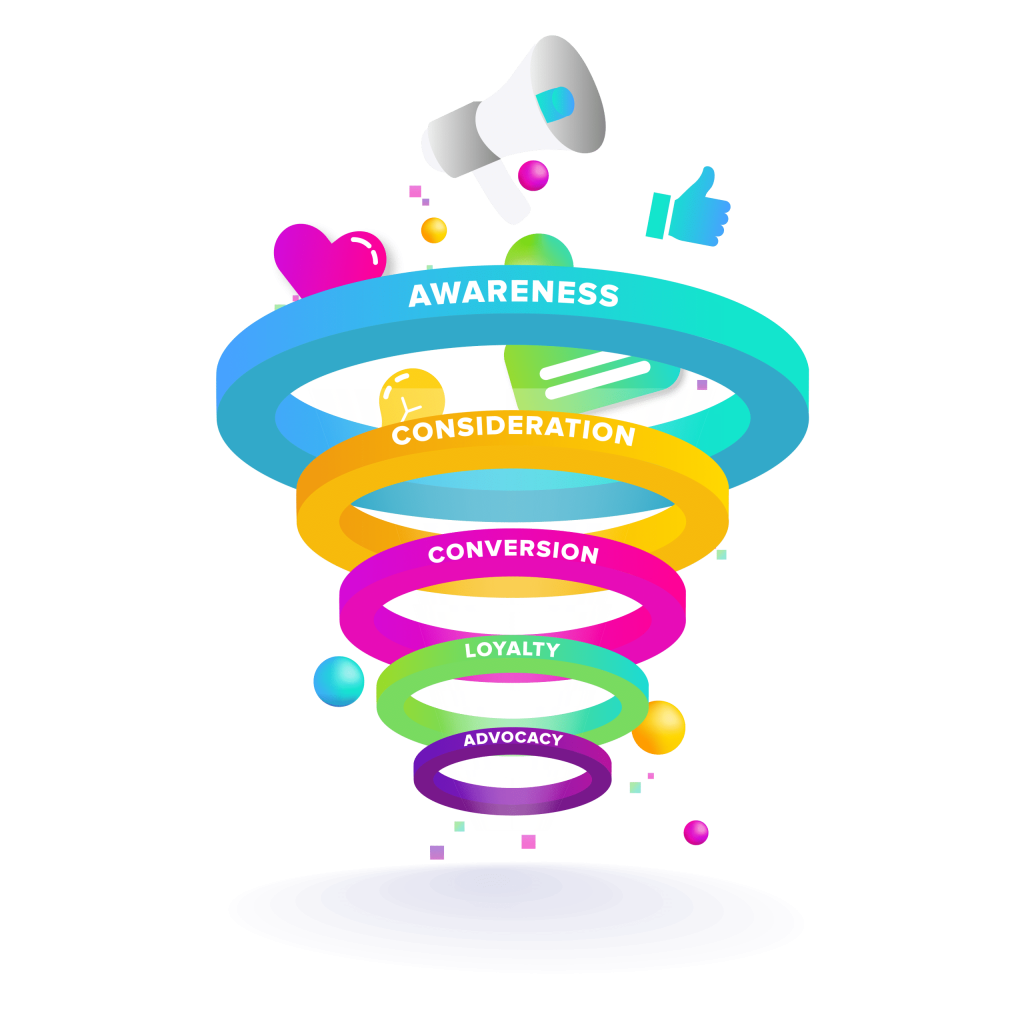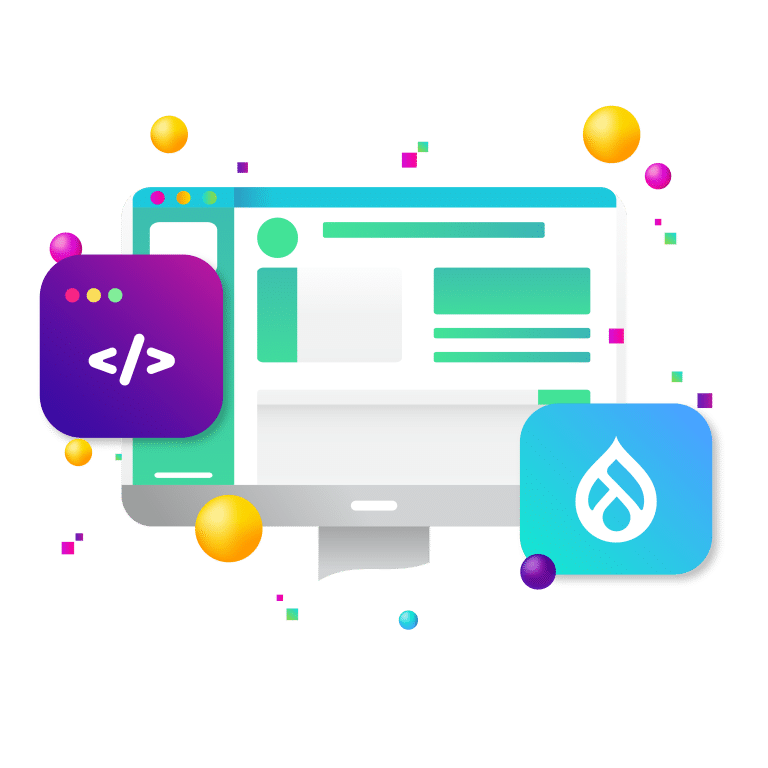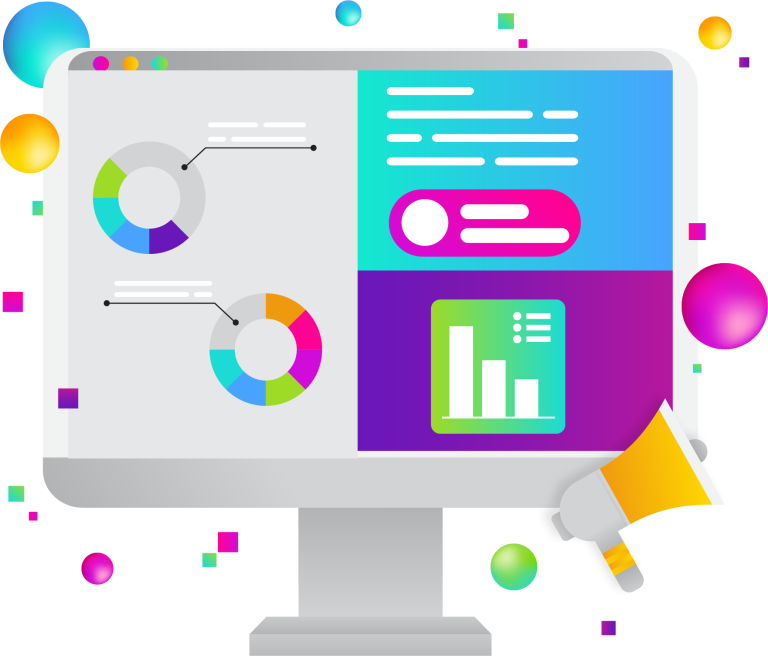
Understanding the digital marketing funnel is crucial for organization’s looking to optimize their online engagements and increase conversions. The digital marketing funnel is a model that describes the stages a prospect goes through before taking an action and converting into a customer. If you’re a company, nonprofit, or association, this article is for you.
Each stage of the digital marketing funnel requires different digital marketing strategies and services to guide prospects towards becoming loyal customers. In this article, we will delve into the marketing funnel in great depth and explore the digital marketing services required at each stage from top to bottom.
The Digital Marketing Funnel: An Overview
The digital marketing funnel is typically divided into four main stages:
- Awareness
- Interest
- Consideration
- Conversion
- Post-purchase loyalty/advocacy
Some models also include post-purchase stages such as loyalty and advocacy. We think this is more than a good idea, but many organizations need to walk before they run. Each stage represents a different mindset of the potential customer and requires specific strategies to move them to the next phase.
1. Awareness Stage
The awareness stage is at the top of the digital marketing funnel, where potential customers first become aware of your brand, product, or service. At this stage, they might not yet know they have a need or problem that your organization can solve. The goal is to attract a wide audience and generate interest.
Digital Marketing Services for the Awareness Stage
Content Marketing
Creating valuable and engaging content such as blog posts, infographics, and videos to attract potential customers. The content should address common pain points and provide informative solutions. If you’re an association or nonprofit, what are your value adds and mission?
Search Engine Optimization (SEO)
Optimizing your website and content to rank higher in search engine results pages (SERPs). This includes keyword research, on-page SEO, and technical SEO to improve visibility.
Social Media Marketing
Leveraging social media platforms to reach a broader audience. This involves creating engaging posts, running ads, and interacting with followers to build brand awareness.
Pay-Per-Click (PPC) Advertising
Running paid ads on search engines and social media to drive targeted traffic to your website. PPC campaigns can be tailored to reach specific demographics and interests.
Influencer Marketing
Influencer marketing means partnering with influencers who have a large following in your industry to promote your brand. Influencers can help you reach new audiences and build credibility.
Public Relations (PR)
Engaging in PR activities such as press releases, media coverage, and events to create buzz and enhance brand visibility.
2. Interest Stage
The interest stage is where potential customers have recognized a need or problem and are actively seeking information. They are aware of your brand and want to learn more about what you offer. The goal is to capture their interest and keep them engaged.
Digital Marketing Services for the Interest Stage
Email or SMS Marketing
Sending targeted email and text campaigns to nurture leads and provide them with relevant information. This can include inspiring stories, newsletters, product updates, and educational content.
Webinars and Online Events
Hosting webinars, live demos, and Q&A sessions to engage potential customers and provide in-depth information about your products or services.
Remarketing
Using remarketing ads to re-engage visitors who have previously interacted with your website or content. These ads can remind them of your brand and encourage them to take the next step.
Interactive Content
Creating interactive content such as quizzes, surveys, and calculators to engage users and provide personalized recommendations.
Case Studies and Testimonials
Sharing success stories and testimonials from satisfied customers to build trust and demonstrate the value of your offerings.
SEO-Optimized Content
Continuing to produce SEO-optimized content that addresses specific questions and concerns potential customers may have. This helps position your brand as an authority in your industry.
3. Consideration Stage
The consideration stage is where potential customers are evaluating different options and considering whether your product or service is the right fit for them. They are comparing features, pricing, and benefits. The goal is to provide them with the information they need to make an informed decision or inspire them if it’s a mission-based sale.
Digital Marketing Services for the Consideration Stage
Detailed Product Information
Providing comprehensive product descriptions, specifications, and comparisons to help potential customers understand the benefits and features of your offerings.
Customer Reviews and Ratings
Encouraging satisfied customers to leave reviews and ratings on your website and third-party platforms. Positive reviews can influence potential buyers’ decisions.
Webinars and Product Demos
Offering in-depth webinars and product demos to showcase the functionality and benefits of your products. This helps potential customers visualize how your solution can meet their needs.
Free Trials and Samples
Providing free trials, samples, or demos to allow potential customers to experience your product firsthand. This can reduce hesitation and build confidence in your offerings.
Comparison Guides
Creating comparison guides that highlight the differences between your products and those of your competitors. This can help potential customers see the unique value your product offers.
Retargeting Ads
Using retargeting ads to stay top-of-mind with potential customers who have visited your website or engaged with your content. These ads can offer special promotions or incentives to encourage conversion.
4. Conversion Stage
The conversion stage is at the bottom of the funnel, where potential customers are ready to make a purchase. They have gathered all the necessary information and are deciding to buy from you. The goal is to make the purchasing process as smooth and straightforward as possible.
Digital Marketing Services for the Conversion Stage
User-Friendly Website
Ensuring your website is easy to navigate, with a clear and intuitive checkout process. Any friction during the purchase process can lead to cart abandonment.
Conversion Rate Optimization (CRO)
Implementing strategies to increase the percentage of visitors who complete the desired action, such as making a purchase or filling out a form. This can include A/B testing, optimizing call-to-action buttons, and improving page load times.
Personalized Offers
Providing personalized offers and discounts based on user behavior and preferences. Personalized incentives can encourage potential customers to make a purchase.
Secure Payment Options
Offering multiple secure payment options to cater to different preferences. Trust and security are critical factors in the purchasing decision.
Live Chat and Customer Support
Providing real-time customer support through live chat or chatbots to address any last-minute questions or concerns. Prompt and helpful support can make a significant difference in converting a lead into a customer.
Clear Return and Refund Policies
Having transparent return and refund policies to reassure customers. Knowing they have the option to return a product can reduce purchase hesitation.
5. Post-Purchase Stage
After a customer makes a purchase, the journey doesn’t end. The post-purchase stage focuses on building loyalty and turning customers into brand advocates. The goal is to provide exceptional service and keep customers engaged for repeat business and referrals.
Digital Marketing Services for the Post-Purchase Stage
Email Follow-Ups
Sending follow-up emails to thank customers for their purchase, provide order updates, and ask for feedback. These emails can also include product usage tips and recommendations for related products.
Loyalty Programs
Creating loyalty programs that reward repeat purchases and encourage customer retention. Points-based systems, exclusive discounts, and early access to new products can incentivize repeat business.
Customer Feedback and Surveys
Collecting feedback through surveys to understand customer satisfaction and areas for improvement. Actively listening to customers can help improve your offerings and customer experience.
Social Media Engagement
Engaging with customers on social media by responding to comments, sharing user-generated content, and providing updates on new products and promotions. Building a community around your brand can foster loyalty.
Referral Programs
Encouraging customers to refer friends and family by offering incentives such as discounts or freebies. Referral programs can help expand your customer base through word-of-mouth marketing.
Ongoing Content Marketing
Continuing to provide valuable content that addresses customer needs and interests. This can include blog posts, tutorials, and newsletters that keep customers engaged and informed.
Understanding the digital marketing funnel and the digital marketing services required at each stage is essential for guiding potential customers through their journey and achieving business success. From raising awareness at the top of the funnel to fostering loyalty at the post-purchase stage, each phase requires specific strategies and services to optimize the customer experience.
If you need help with your digital marketing funnel or any other aspect of digital marketing, turn to the New Target team. We’re experienced experts who bring enthusiasm to all our projects and campaigns.



